- Home
- Nancy Means Wright
Broken Strings Page 11
Broken Strings Read online
Page 11
“Willard told me,” she said. “He was looking for Puss, to give her the puppet. She didn’t answer and he was worried. And then he had to use the bathroom himself, but he saw her inside, he thought she was using it. He didn’t go in.”
“Uh huh.” Higgins was still sounding know-it-all. She’d ignore him.
“What about Rudolph?”
“No prints. Probably had on gloves. He’s a professional. We know he took the stuff.”
“So Rudolph could have hit her. When she came in on him rolling up the rug. He knew it meant he’d be back in prison.”
“So could your sign maker, Fay.”
“Oh, for God’s sake. What motive did Willard have? He was just delivering a puppet.”
“I can’t tell you right now, but we’ll find out. We’ll have him in for questioning. I understand there was a little run-in between him and that woman?”
“Hogwash. There was a run-in between her and me, too. She told me to stop butting in. Her very words.”
“Don’t think we don’t have you on our list.” He gave a foolish little chuckle.
She sighed. “Well, I’m hanging up if that’s all you’ve got to tell me. It’s been a long day. Another funeral. I want this killing to stop.”
“Things often run in threes.” He chuckled again, and she hung up.
Ethan came thumping down the stairs, leaping the last five rungs. “I had an e-mail from Beets,” he said. “And he’s in big trouble.”
“What? You heard from him? What trouble? What did Beets say?” Ethan was being perverse and loving it. He slouched over to the cupboard, slathered peanut butter and jelly on a bagel. She grabbed his arm. “Tell me! Now.”
Ethan looked up surprised, like he’d just realized she was standing there. He took a bite of the bagel. Then he stuck a hand into his pocket and handed over a printout of the e-mail. It read, all in small caps: “ethan. im not coming back. i can’t. i want my cell phone its under my pillow. tell you later where to send.”
Fay stared at it, but the message didn’t change. “Is there a sender’s address? What time did he send it? From where?”
“You can read it,” Ethan said, chewing his bagel.
“My hand is shaking, so read it!”
Sighing, Ethan took back the printout. “9:10 p.m. It was sent last night, I guess.”
“Where,” asked Glenna, to whom the internet was a shadowy world she had no interest in exploring. “Fay asked you where. Don’t be such a jerk. You know she’s worried about the boy. Where’d he send it from?”
Ethan shrugged. “Some internet café?” He sounded so know-it-all that Fay wanted to spank him. Sometimes he was his mother’s child only and not Fay’s grandson at all.
“Sent it on my money,” Glenna said, pasting a hunk of peanut butter on a Triscuit. “That vulgar Rudolph emptied my money jar. I expect Beets got some of that.”
“I’ll pay you back,” Fay said. It was her fault, she supposed, for bringing in a foster child with a jailbird for a father. A father who might have killed somebody.
Poor Beets. One more failure to add to Fay’s list. She dropped onto a kitchen stool. She’d tried hard to communicate with the boy, to listen. Then just when she thought she was succeeding, there was the bullying episode in school. He said the kid called him a name, but wouldn’t say what that name was. But the kid was a year younger, unarmed, and Beets had the apple in his pocket. Evidently this teasing had happened before; he was prepared.
Yet the boy ran from the father – that was hopeful. Hopeful in the sense that he recognized Rudolph was a bad influence. “Well, I won’t let him quit school,” Fay said. “I’ll go see Rudolph tomorrow. We’re going to find Beets and get him back.”
Though how she was going to do that, she didn’t know. So many things to do, she hardly knew where to begin! Find a killer, maybe two killers. Get a show on the road for Valentini Marionettes. As if to remind her, here was Chance, banging in through the door with a hand puppet. A fat bullfrog with a green face and yellow bulging eyes that wiggled when she stuck fingers into them.
“I made at it at the Branbury Studio School,” Chance said. “It’s my first one, you like it? Can we work it into the next show?”
“I can’t see why not,” Fay said. “I suppose your good fairy could carry it. If you can handle a marionette and a hand puppet at the same time, or at least alternately. Which reminds me, we’ve got to rehearse.” They’d never done a show without Marion. The thought was scary. “Chance. Call Willard and tell him we’ll rehearse after supper. I’ve been giving him too many orders. He needs to hear from someone else. Call him now, okay? He’s probably home making a yew controller.”
“Yes, and I found him cutting down my yew bush,” Glenna said. “I won’t have it, I said. I told him to cut down somebody else’s life, not mine. I can’t afford it.”
Ethan made a “loony” sign with his hand, and pointed at Glenna.
“I saw that,” Glenna said. “See if I let you have any of my Chunky Monkey.”
“So cut it out,” Fay told Ethan. “Don’t laugh at what you don’t understand.”
“I found your skull artist,” Ethan said, buttering a second bagel.
“What? Why didn’t you say so?”
“You were so wrapped up in Beets, you didn’t ask.” Ethan’s head dipped low into the peanut butter jar.
This time Fay got up to pour herself a glass of wine, and a scotch for Glenna. She was seriously thinking of sending Ethan home to his mother in the Northeast Kingdom. He was driving her bananas with his poor communication skills. Testosterone, she’d read, prunes away the communication centers of the brain. Ethan must be full of the stuff.
“So?” she said, glaring at him. “What did you find?”
“Two of them.” Ethan smiled. He had everyone’s attention now. “On the web. One lives in Amsterdam – the Netherlands. So that rules him out.”
“Maybe. Maybe not. Go on. Who else?” Fay gulped her wine.
“Guy who digs up dead people. Like illegally, I guess. So he can draw the skulls and bones and stuff. Get them into exhibits, the website says.”
“Good lord. But why would this fellow write threatening letters to Marion?”
“That’s the point.” Ethan gave her a pitying look, as if she should have already figured it out. She wanted to shake him. He needed a haircut for one thing. His dark brown hair fell down his back, loose and stringy.
“I found his blog. He does a lot of hating, calls women “puppets.” All made up he says, phonies. He hates gays and blacks and yellows and reds – hates practically everybody! I guess you’d call him an ultra-conservative.”
“My God.” Fay put down her glass. Glenna spilled hers.
Chance said, “What a creep. I’ll call Willard, see how he’s doing.” She went into the living room with her cell phone.
Ethan smiled, and plastered a third bagel with peanut butter.
“So where does he live?” Fay asked. “How can we find this person who hates everything worth living for?”
“I’ve no idea,” Ethan said with his mouth full. “The blog doesn’t say.”
“Then find out!” Fay cried. “That’s part of your assignment!”
“Willard’s not home,” Chance said, coming back into the room. “So I called the psychic’s cell. She was in the hospital emergency.”
“Oh dear. What’s wrong with Stormy?”
“Nothing’s wrong with her. It’s Willard. He swallowed some yew sap. They’re trying to pump him out.”
* * *
Beets was in a coffeehouse, chewing on a raisin-pecan scone. He’d just finished typing an e-mail to Ethan on some teenager’s laptop. Mad that he left his cell phone, Rudolph rushing him out like that. He’d just jumped out of the truck when his father got off the thruway and then stopped at a red light. They were on their way to Canada, Rudolph said, and Beets didn’t want to go to Canada. The old man had stolen a big expensive rug and a picture framed in solid gold
and now he was on the run.
Beets was on the run, too, but he didn’t want to be on the same run as his father. He’d helped roll up the rug and pitch it into the U-Haul, but he didn’t like doing it. He’d been in that puppeteer’s house once before with Fay. It was too bad the Marion lady had to die. For a time he’d wondered if his father had anything to do with that, but his father had been sprung loose, he said, after the lady kicked off. As far as Beets knew, his mother was the only one who, in his opinion, his father had killed.
His mother had run away from home a couple of times but his father always went and got her back. Once Ma threw a kettle of hot water on him and his father knocked her to the floor and pulled up her dress and – Beets had left the room. A year later and Ma was dead. And six months after that his father was in jail, some kind of masked hold-up. After that it was in and out of jail and finally in for ten years, but out in five for good behavior.
His father could charm a fly to sit on his hand. And then he’d swat the fly.
Beets savored the scone. Fay didn’t make scones, she hardly baked at all. Here he was, free for the first time in his life. He was sorry to leave Apple, but she liked it at Flint’s. Geez, he couldn’t go back anyway, not after that school episode. Couldn’t face the other kids. Couldn’t face that school counselor. She didn’t believe when he told what Joel had called him. Beets was a foster kid – already a strike against him. Hitting Joel was the second strike and when he told the counselor off, it was the third, and O-U- T.
Beets didn’t like people giving him orders. Didn’t like his father making him take cash out of Glenna’s purse. Beets felt bad about that. The old lady always slipped him extra cookies when he went to bed.
He’d finished the scone now, paid the teenager fifty cents to use her laptop and had six dollars and sixty-two cents left in his pocket. Enough for something to eat tonight. And then sleep – where? A shelter? But they’d be looking there, he bet, the cops. They’d be after him as soon as that Puss woman called the police. She’d come in on them just as his father was getting down the portrait. Beets had run out back to the truck, let his father handle the lady. He heard her scream bloody murder, and then his father came out and they sped out of town. When Beets asked what he’d done, his father said, “Nothing.”
Beets had to take him at his word. What else could he do?
“We’ll have to lie low now, kid,” his father had said, taking off his gloves and mask.
Beets didn’t like that “we.” He hadn’t wanted to steal that rug. He wouldn’t want to hurt that other lady, his mother wouldn’t of liked that. His mother had red hair like his own – it tickled his neck when she lay beside him to help him sleep. She had a nice voice, too, sort of like the hum of Willard’s engine when it steamed around the track.
He blew his nose into his paper napkin, then crushed his empty plate into an over-full trash bin. Found a half dollar on the floor and put it in his pocket. Outside he saw a sign that said he was in Georgia Plains – wherever that was. It couldn’t be far from Canada. Maybe he could slip through the woods into Canada. It was north, he knew; Willard had taught him how to tell direction by the sun. And now the sun was sliding down over the building to his left. So North would be straight ahead.
He started walking.
* * *
Chance was annoyed. Billy said to meet at Alibi at seven, and then he didn’t show. And here Chance had gotten out of the evening cleanup so she could meet him. She didn’t like sitting here alone when the bar guy knew she was underage even though Billy had had a fake ID made up for her. Chance could pass for twenty-one easy, he said, and she knew she could. She was five-eight, all the good body parts – in seven months she’d be eighteen. A little lipstick went a long way though she hated makeup—it made her think of that foster mother who painted her face rosy-pink, then went to church and sang Jesus Loves You. Like you had to put on a mask for Jesus to love you.
Chance’s Other Life that was. When she was called Rosemary. And the foster mother said love and obey your foster parents, your big brother. “Bull,” Chance said, and not just for the “brother” who’d said he’d strangle her if she told what he tried to do. At least that time she’d gotten loose.
Bull for Billy, standing her up like this. She left a quarter tip for her ginger ale and went to the door. Sat outside on a bench where the Otter Creek falls crashed over a pile of rocks and then swept on down to Vergennes. It was chilly here, cold wind blowing off the creek. It felt good on her hot cheeks; she was still mad. She’d been too giving. Just because Billy was cool: the dreadlocks, the Honda bike, the music.
They’d met at Alibi six months before. She’d come with another girl. He was alone, he came over to sit with them, surprised to find she was only seventeen. The other girl moved off. He asked her questions about herself, the foster homes. He didn’t seem like the other guys who were mostly after her body—especially some of the football players, full of testosterone. “You should meet Marion,” she’d said, and when he lifted an eyebrow, she said, “Marion Valentini, the puppeteer.”
“Oh, that Marion, yeah.” She came to one of his gigs, he said. She liked his band.
“She thought she could use a Ghouls CD in one of her shows. I said we’d do it live.” His face flushed when he said that. “So I went to one of the shows. Up in Bristol.”
“Did you like it?”
“It was okay, I guess. I’m not into dolls.”
“They’re marionettes, not dolls. They represent people. You can do lots of stuff with them. Satirize, politicize, you know.”
He laughed. He had a nice soft sexy in-your-face kind of laugh. “Sure,” he said, and asked her about living with Fay. She told him about the running away, about her English teacher who liked her writing and thought she could help her get a scholarship to college. “If I decide to go – I don’t know. How about you?”
Billy hadn’t gone to college, he went straight into drumming in somebody else’s band. “Travelled some, you know, hanging out in pubs – Ireland, England, France…” He ticked off the countries.
“Whoa. How’d you manage that?” Chance wanted to travel, wanted it in the worst way. But ‘finish high school first,’ the teacher said. It was all an illusion. College. Europe.
“Worked,” he’d said, shrugging. “Passed the hat. Little luck here and there.” He told about finding a German kid with hashish and a reconditioned Army jeep, being stopped at the Turkish border. “We could be there still if they’d found it.”
“Whoa.” She looked at him, amazed. If he’d said right then: ‘You want to go to France? Spain? Turkey – anywhere!’ she’d have said, ‘I’ll be ready in the morning.’ He must have sensed what she wanted to say because he gave a soft laugh and said, “Take a walk?” And she nodded. She’d wanted him then, right then, though she couldn’t put words to the wanting. And thrilled with the thought of Europe and music and travel to strange places and making love, right by the falls maybe – something happened. She felt swept off the rocks, headlong, crazy in love. He took off her shirt, they kissed, and he could have done anything to her then, anything in the world and it would have been okay.
Only he just buttoned up her shirt again. Smiled in her face and said he had to go, he’d walk her to her bike. Said he’d call her, and he did. Said she was too young and she said, “I can prove to you I’m not.” And he laughed and patted her on the buttocks.
But that was then. Now, this evening, a woman broke into her thoughts, sat down beside her on the bench with a noisy child. Chance got up. A chill wind penetrated her body. She was angry all over again at Billy’s standing her up. She needed an explanation, right there and then. So she ran up the road to the one-bedroom apartment he rented that faced out on the creek. It would be easy to get in through the rear fire escape that led to the third floor window he never locked. She’d discovered it this past summer when Billy was sick from an overdose of something, he wouldn’t say what. Today she was lucky again, the window w
as open a crack, so she pushed it out and climbed in.
Nobody. Where was he? It was the first time she’d been in here without him – it gave her a funny feeling, like she was in a cave. For that’s what the place looked like: a cave. No lights where he usually left the red and blue bulbs blazing, shades drawn down to the last inch, a huge map on the floor like he’d been looking for something. She dropped to her knees to examine it. The British Isles. Was he going there without her? He’d circled some of the places: London, Canterbury, Penzance, York, other towns she’d never heard of. The Scottish Orkney islands, Aran islands off Ireland. She started to pocket the map – then took it out again. He’d wonder who had been in here.
Though why shouldn’t she be? She went into the bedroom – shades down in there too, the unmade double bed. She smoothed the pillow and pulled up the sheets. Then looking at the bed, she was overcome. Sank back into the soft pillow, closed her eyes, smelled the cigar he sometimes smoked. Felt the breeze off the creek; heard the honking of geese getting ready to head south. Thrilled at the sound of them.
Billy was her man. She had a right to be here, alone. She should have a key. When she heard the key turn in the door and someone enter, Billy probably, she didn’t say a word. Let him find her, let him give his excuse. It had better be a good one.
Chance waited. Someone coughed. A woman’s cough. A woman had a key to his room? She heard the woman rummage around, then murmur, “Billy, you SOB.” The voice was familiar – where had she heard it before? Speak again, she urged the voice, but it was silent. Then, like it was ten hours later but only ten minutes, the footsteps left. This time she heard high heels, the door shut, the lock click. She lifted the bedroom shade but saw only a woman walking her two poodles. That woman wore flat shoes.
When she went back into the living room the map was gone. That’s what the woman had come for then? She let herself quickly out, heard the door lock behind her, and ran down the two flights to the outside door. The intruder had vanished into the oncoming night. There was only Billy moving up the street, head down. She waited there on the sidewalk, hands on her hips.

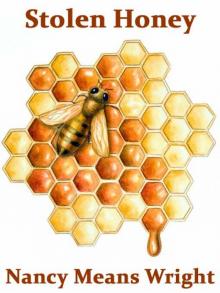 Stolen Honey
Stolen Honey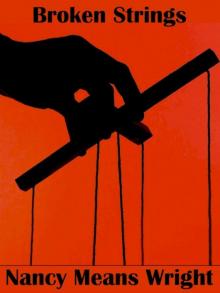 Broken Strings
Broken Strings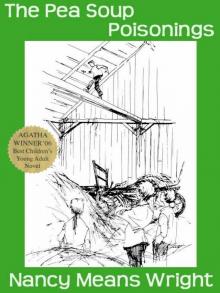 The Pea Soup Poisonings
The Pea Soup Poisonings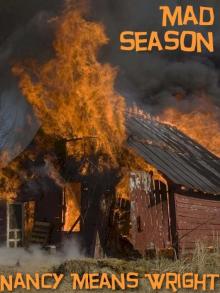 Mad Season
Mad Season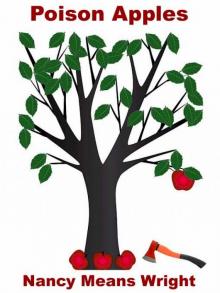 Poison Apples
Poison Apples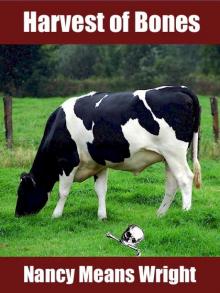 Harvest of Bones
Harvest of Bones